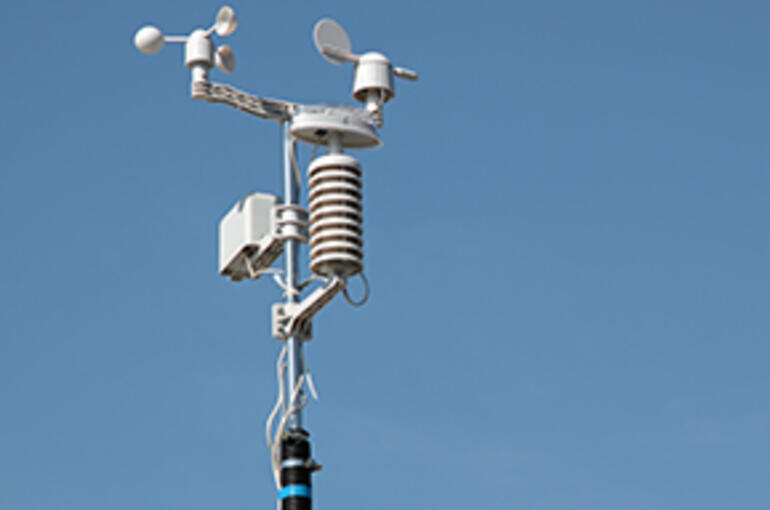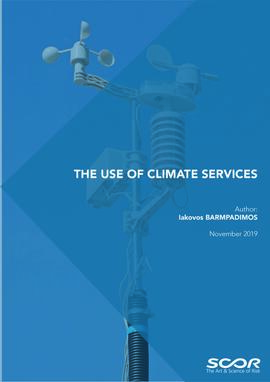- FR
- EN
SCOR’s Agricultural Modeling Team contributes to a scientific paper on the use of climate services
November 13, 2019

Published in the online journal Remote Sensing, the paper proposes a way to ensure that climate data users have access to quality-assured data. SCOR Cat Risk Analyst Iakovos Barmpadimos explains.
The Use of Climate Services to Improve Risk Assessment
SCOR’s Agricultural Modelling Team has contributed to a recent scientific paper on the use of climate services by decision makers in the public and private sectors.
Climate services are decision-making aides derived from climate information. Among numerous other applications, they can be useful to assess the risk attached to certain weather-sensitive insurance products, such as parametric insurance and agricultural insurance. Used properly, climate services can improve risk assessment.
The scientific paper, published in the online journal Remote Sensing1 and co-authored by hydrologists, economists, climate and computer scientists from five different countries, proposes an overarching structure for assessing the quality and usability of climate services. The aim of this structure, or “AQUE2”, is to ensure that the end users of climate services have access to quality-assured climate data, as well as to clear guidance on the use and benefits of that data. The AQUE is crucial to establishing a relationship of trust between climate service providers and various downstream users. This trust fosters the sustainable use of climate data and of information products derived from it, leading to a flourishing market for climate services.
A basic component of the AQUE is a cyclical process called the Single Product Assessment, which relies on a climate data inventory. Using this inventory, the climate service provider:
a) provides metadata about the climate data in question,
b) conducts gap analysis to recommend the inclu-sion or exclusion of climate variables from the inventory, and
c) provides user guidance on the strengths and weaknesses of the climate data.
Recommendations from step b) can be used to update the climate data inventory, thereby closing the Single Product Assessment cycle.
In many cases, multiple data sources exist for the same variable – this is an advantage for users in the sense that they can compare results from multiple products. Before doing so, however, they should conduct a Multi-Product Assessment to make sure that the climate data from the multiple sources concerned are measuring the same thing.
Many climate service applications require multiple climate variables. These applications consider interactions between land, atmosphere and ocean, as well as looking at energy, carbon and water cycles. For such applications, a Thematic Assessment is required to document the physical consistency of the multiple climate products involved.
Based on these Single, Multi and Thematic Assessments, the final step of the AQUE is the Usability Assessment. The Usability Assessment specifies the metadata required by the end user, generates feedback for the service provider about metadata presentation, and indicates links between climate-data-quality features and the benefits of these for the end user.
The paper includes a SCOR test case that demonstrates how climate services can be used by calculating the price of hypothetical parametric cover for extreme El Niño events, which cause floods in Peru. This test case highlights differences in the results when using multiple data sources, and pinpoints important aspects of the data for discussion. For example, the data provider should quantify data uncertainty and biases, particularly for extreme events, and should also provide information on the homogeneity of the data in question (which is a particular concern for longer data records). The points raised in this discussion are a key component of the Usability Assessment.
SCOR is constantly advancing its expertise on the use of weather and climate data, and is also increasing its exposure to climate-sensitive business such as agriculture and parametric insurance. Our involvement in this scientific publication underlines our continuous efforts to improve risk knowledge.
As well as supporting our existing portfolio, these efforts help us to remain at the forefront of expanding and transforming lines of business, such as agriculture and parametric solutions. They also provide an added benefit for our clients, with whom we share our risk knowledge and expertise throughout our long-term relationships.
1 Source : Zeng, Y.; Su, Z.; Barmpadimos, I.; Perrels, A.; Poli, P.; Boersma, K.F.; Frey, A.; Ma, X.; de Bruin, K.; Goosen, H.; John, V.O.; Roebeling, R.; Schulz, J.; Timmermans, W. Towards a Traceable Climate Service: Assessment of Quality and Usability of Essential Climate Variables. Remote Sens. 2019, 11, 1186.
2 AQUE - Assessment of Quality and Usability of Essential Climate Variable Products
Author :
Iakovos BARMPADIMOS CAT Risk Analyst
Iakovos Barmpadimos holds a PhD in Environmental Science from ETH Zurich and an MSc in Applied Meteorology from the University of Reading, UK. In August 2012 he joined the Nat Cat team of SCOR in Zurich as a Cat Risk Analyst. Since April 2015 he is with the Agri and Specialty Risk Modelling team. His activities in SCOR include atmospheric hazard assessment, modelling, pricing and accumulation.

